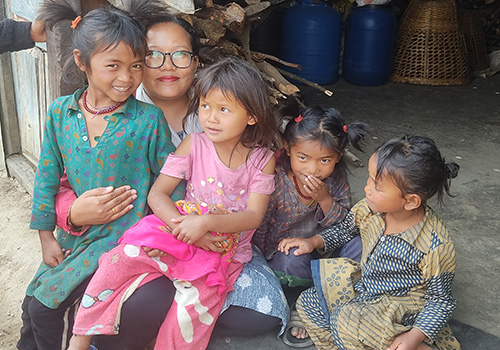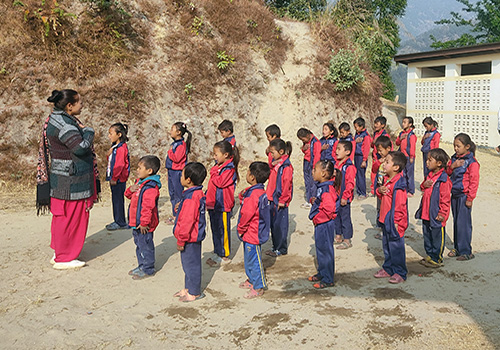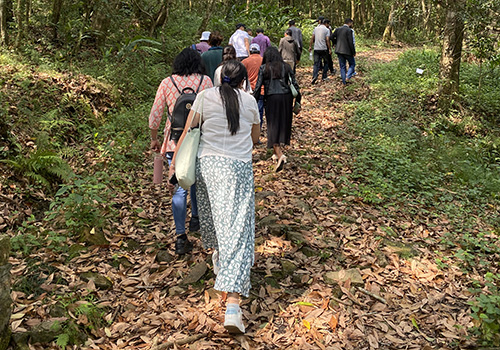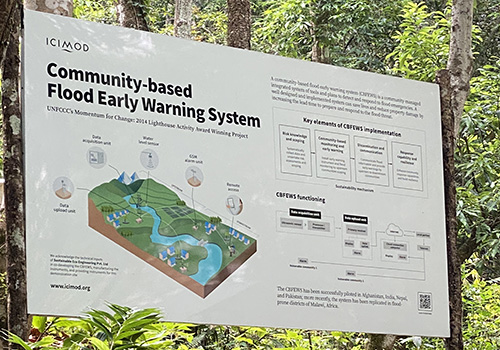NEWS & UPDATES
Advancing Inclusive Education and Support for Children with Disabilities in Helambu: JNF and RCRD Collaboration Update
21 June 2024
 Led by our mission towards inclusive education under our Better Life project in Helambu, JNF has collaborated with RCRD, a Bhaktapur organization that has been relentlessly working for the betterment of people with disabilities for the past 30 years. RCRD has mobilized three of their staff in Helambu to support and rehabilitate, specifically children with disabilities (CWD) in the area. Today, with RCRD, we are supporting 44 CWD through various interventions such as counseling, physiotherapy, advocacy, nutrition, enrolling in schools. Every month, we circulate updates on our workings within our team and concerned authorities in Helambu. For the Nepali month of Baisakh-2081, the following progress has been made:
Led by our mission towards inclusive education under our Better Life project in Helambu, JNF has collaborated with RCRD, a Bhaktapur organization that has been relentlessly working for the betterment of people with disabilities for the past 30 years. RCRD has mobilized three of their staff in Helambu to support and rehabilitate, specifically children with disabilities (CWD) in the area. Today, with RCRD, we are supporting 44 CWD through various interventions such as counseling, physiotherapy, advocacy, nutrition, enrolling in schools. Every month, we circulate updates on our workings within our team and concerned authorities in Helambu. For the Nepali month of Baisakh-2081, the following progress has been made:
1. Home Visits
7 parent self-help groups set up with a mission to address the needs of CWD (children with disabilities) held their monthly meeting. Repeated home-visits were made with 11 families of CWD. They are currently being provided with essential therapy and counseling.
2. Capacity Building
School meetings were held in 5 schools in the area. Along with this, we have also facilitated the school enrollment of 2 girls with disability. Together, in cooperation and coordination with the Helambu Agricultural Development Board, 3 families have been provided support to start beekeeping. These have been registered on behalf of the CWD in these 3 families. This is to ensure that the returns from beekeeping should benefit the child affected by disability in the family.
LAPA Update: Creation of an integrated Local Adaptation Plan for Action (LAPA) of Helambu rural municipality
21 June 2024
Under the aegis of the local people of Helambu, the Local Adaptation Plan for Action, detailing the 65 settlements across Helambu, has been formulated and printed. Over 1500 people were consulted in the production of LAPA.
Child Protection and Safeguarding Update: Child Protection Training with CWISH
21 June 2024
 JNF has also partnered with CWISH (Children-Women in Social Service and Human Rights) to address the safety and protection of children in Helambu. CWISH is a women-led non-profit that has been working towards child protection, right to education and family empowerment for the last 30 years. The Sindupalchok region, historically vulnerable to human trafficking, experienced a significant surge in such activities following the devastating 2015 earthquake. Together with CWISH, we have just completed the first ever Child Protection Training of child protection focal teachers appointed by the School Management Committees (SMC). This 2-day training focused on child rights and safeguarding mechanisms.
JNF has also partnered with CWISH (Children-Women in Social Service and Human Rights) to address the safety and protection of children in Helambu. CWISH is a women-led non-profit that has been working towards child protection, right to education and family empowerment for the last 30 years. The Sindupalchok region, historically vulnerable to human trafficking, experienced a significant surge in such activities following the devastating 2015 earthquake. Together with CWISH, we have just completed the first ever Child Protection Training of child protection focal teachers appointed by the School Management Committees (SMC). This 2-day training focused on child rights and safeguarding mechanisms.
Emergency First Responders Training: Empowering Helambu for Disaster Response
21 June 2024
Just Nepal Foundation, in collaboration with Helambu rural municipality and the Nepali army recently organized an emergency first responders training from May 26th to 1st June, 2024. The event, held at Yangrima Eco Lodge, Sermathang, aimed to empower community members with essential skills for effective disaster response. Given Helambu’s vulnerability to natural disasters, the training focused on enhancing local preparedness through education on disaster differentiation, first aid, fire safety, and rescue techniques.
A total of 71 participants from the 7 wards of Helambu consisting of a mixed group of students, teachers and farmers from diverse ethnicities took part in the program. The training taught participants to respond quickly and effectively, reducing potential injury and loss of life. Emphasizing family and community security plans and raising awareness about climate change, the training seeks to contribute to long-term resilience. Recommendations for improvement included increasing rescue equipment availability and continuous engagement with follow-up sessions.
The primary objectives of the training were as follows:
- Equipping individuals and organizations with the necessary knowledge and skills for effective emergency response, such as first aid, search and rescue, incident management, and crisis communication.
- Strengthen the technical knowledge and skills of Ward level Disaster Management Committees to effectively respond to disaster in support from youth groups.
- Train youth groups to act as efficient and safe rescue leaders during disasters, enhancing the community’s immediate response capacity.
- Increase overall disaster preparedness within the community by educating participants on potential hazards, risks, and vulnerabilities, first aid, fire safety, earthquake safety, flood and landslide prevention, and early warning systems.
Nepal faces significant climate and disaster risks, with vulnerable groups often excluded from mainstream efforts. Thus, the training looked at the intersections of emergency response too. Participants were provided an informative session by RCRD Director, Surya Bhakta Prajapati on addressing the needs of people with disabilities during disasters. This response training in Helambu aimed to bridge this gap, supporting communities in locally led adaptation and disaster management. It sought to strengthen technical capacity, disaster response, and community resilience, fostering a safer and more prepared Helambu.
Sustainable Solutions for Climate Resilience - Insights from the ICIMOD Living Mountain Lab Visit
21 June 2024
 Envisioning a sustainable and resilient future, Just Nepal Foundation organized a one-day exposure visit to the ICIMOD Living Mountain Lab at Godavari on Friday, 17 May 2024. In attendance were our 7 Climate Change Champions, Just Nepal staff and Dr. Deepak Rijal, who were given a tour of the 30 hectare ICIMOD Living Mountain Lab by our guide, Purnaji.
Envisioning a sustainable and resilient future, Just Nepal Foundation organized a one-day exposure visit to the ICIMOD Living Mountain Lab at Godavari on Friday, 17 May 2024. In attendance were our 7 Climate Change Champions, Just Nepal staff and Dr. Deepak Rijal, who were given a tour of the 30 hectare ICIMOD Living Mountain Lab by our guide, Purnaji.
As part of our initiative to build resilient mountain communities, Just Nepal Foundation trained and mobilized 90 Helambu youth at the very outset of our endeavors. These youth have progressed to actively participating in community work not just through JNF but on their own too. Presently some of them have been chosen as Climate Change Champions as part of JNF’s efforts to better equip local communities in Helambu against the adverse effects of climate change.
The ICIMOD visit aimed to introduce the Climate Change Champions to sustainable agro-farming solutions and techniques with the hope that they may adopt some of them in their own working areas. Few of the demonstrations that garnered much interest were the brick lined cold storage. Participants highlighted that during the monsoon, consumables like potatoes and tomatoes often suffer wastage due to lack of proper storage. Given its low cost of production, the ‘zeer pot’ cold storage seemed possible to implement at mountainous regions.
Producing low cost bio-brickets highly inspired one of our Climate Champions, Tenzing Lopsang Hyolmo to start his own bio-bricket production in Helambu. He saw this as a possible solution to tackling fuel shortage during road blockades in monsoon.
Planting pest-resistant crops, soil erosion preventing plants and SALT (Sloping Agriculture Land Technology) for kiwi cultivation were also viewed with much interest. The method of kiwi cultivation garnered much interest given the low cost, natural wooden trellis used to support the kiwi vines. While Helambu does engage in kiwi cultivation, heavy cemented structures are often used to support the vines. This adds to the financial burden on local farmers seeking to make a livelihood off the kiwi fruit. Alternative methods such as using the wooden trellis inspired some of our team members to employ them back in Helambu. Purnaji shared that picking kiwi just before they ripened would ensure their safety from monkeys who are a constant threat to crops in Helambu.
The tour also included simple solar drying tools that were not only cost-effective but well-suited for Helambu, much of which remains inaccessible in the monsoons.
 In addition to agriculture, solar technology, irrigation methods and electricity generation, an early flood warning system was also demonstrated. Given Helambu’s recent flooding disaster in 2021, timely interventions are crucial to minimize loss and damage from future calamities.
In addition to agriculture, solar technology, irrigation methods and electricity generation, an early flood warning system was also demonstrated. Given Helambu’s recent flooding disaster in 2021, timely interventions are crucial to minimize loss and damage from future calamities.
Following lunch, participants were asked to share their learning. Valuable insights were shared. These were:
- Growing bamboo barriers against pests.
- Using peltric set technology to generate electricity through a hydro ram water pump.
- Waste management through composting on small areas.
- Electric fencing to keep pests out.
- Four-mouth stove.
- Trapping mist with a mesh net for water.
- Solar water distiller.
- Seed bank with 50 varieties of millet
The exposure visit was the first of its kind for the entire JNF team and it not only provided momentary relief from daily work but also encouraged our members to seek innovative, cost-effective and locally viable solutions to tackling climate change.
Subscribe to our Newsletter
